虚拟语气与倒装句
语法:虚拟语气和倒装句
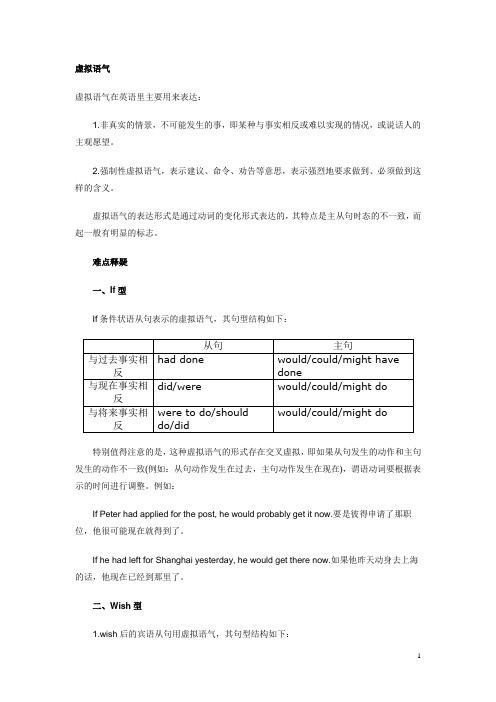
虚拟语气虚拟语气在英语里主要用来表达:1.非真实的情景,不可能发生的事,即某种与事实相反或难以实现的情况,或说话人的主观愿望。
2.强制性虚拟语气,表示建议、命令、劝告等意思,表示强烈地要求做到、必须做到这样的含义。
虚拟语气的表达形式是通过动词的变化形式表达的,其特点是主从句时态的不一致,而起一般有明显的标志。
难点释疑一、If型If条件状语从句表示的虚拟语气,其句型结构如下:特别值得注意的是,这种虚拟语气的形式存在交叉虚拟,即如果从句发生的动作和主句发生的动作不一致(例如:从句动作发生在过去,主句动作发生在现在),谓语动词要根据表示的时间进行调整。
例如:If Peter had applied for the post, he would probably get it now.要是彼得申请了那职位,他很可能现在就得到了。
If he had left for Shanghai yesterday, he would get there now.如果他昨天动身去上海的话,他现在已经到那里了。
二、Wish型1.wish后的宾语从句用虚拟语气,其句型结构如下:与过去事实相反wish that 从句的谓语动词用had done与现在事实相反wish that 从句的谓语动词用did与将来事实相反wish that 从句的谓语动词用would/could do例如:I wish they would change the menu.他们要是改变一下菜单就好了。
I wish I hadn’t spent so much money.我要是没花那么多的钱就好了。
同样地,在as if/as though引导的宾语从句中和以if only引导的带有感叹色彩的虚拟语气句子中,谓语动词与wish引导的宾语从句中的虚拟形式相同。
2.由if only 引导的虚拟语气与过去事实相反if only 谓语动词用had done与现在事实相反if only 谓语动词用did例如:If only she had asked someone’s advice! 她要是征求了别人的意见就好了!3.由as if/as though 引导的虚拟语气与过去事实相反as if/as though谓语动词用had done与现在事实相反as if/as though谓语动词用did例如:He talks about Rome as if he had been there himself.谈论起罗马来就像他去过似的。
虚拟语气和倒装句讲解
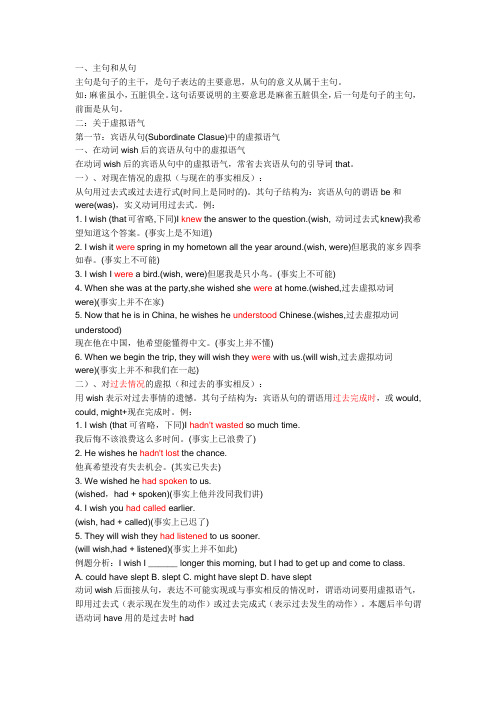
一、主句和从句主句是句子的主干,是句子表达的主要意思,从句的意义从属于主句。
如:麻雀虽小,五脏俱全。
这句话要说明的主要意思是麻雀五脏俱全,后一句是句子的主句,前面是从句。
二:关于虚拟语气第一节:宾语从句(Subordinate Clasue)中的虚拟语气一、在动词wish后的宾语从句中的虚拟语气在动词wish后的宾语从句中的虚拟语气,常省去宾语从句的引导词that。
一)、对现在情况的虚拟(与现在的事实相反):从句用过去式或过去进行式(时间上是同时的)。
其句子结构为:宾语从句的谓语be和were(was),实义动词用过去式。
例:1. I wish (that可省略,下同)I knew the answer to the question.(wish, 动词过去式knew)我希望知道这个答案。
(事实上是不知道)2. I wish it were spring in my hometown all the year around.(wish, were)但愿我的家乡四季如春。
(事实上不可能)3. I wish I were a bird.(wish, were)但愿我是只小鸟。
(事实上不可能)4. When she was at the party,she wished she were at home.(wished,过去虚拟动词were)(事实上并不在家)5. Now that he is in China, he wishes he understood Chinese.(wishes,过去虚拟动词understood)现在他在中国,他希望能懂得中文。
(事实上并不懂)6. When we begin the trip, they will wish they were with us.(will wish,过去虚拟动词were)(事实上并不和我们在一起)二)、对过去情况的虚拟(和过去的事实相反):用wish表示对过去事情的遗憾。
语法虚拟语气与倒装句使用
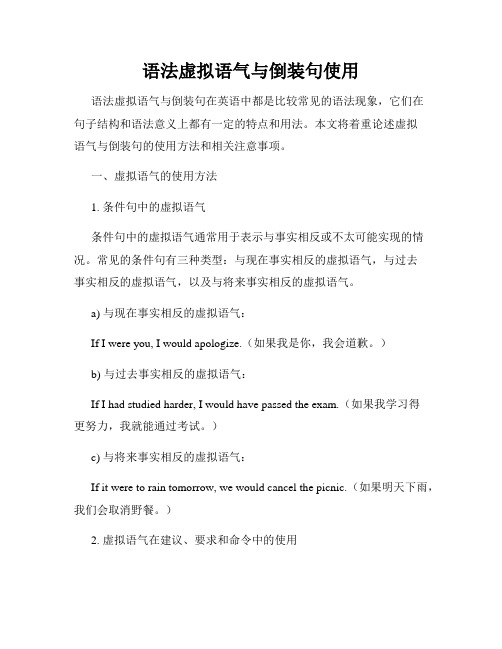
语法虚拟语气与倒装句使用语法虚拟语气与倒装句在英语中都是比较常见的语法现象,它们在句子结构和语法意义上都有一定的特点和用法。
本文将着重论述虚拟语气与倒装句的使用方法和相关注意事项。
一、虚拟语气的使用方法1. 条件句中的虚拟语气条件句中的虚拟语气通常用于表示与事实相反或不太可能实现的情况。
常见的条件句有三种类型:与现在事实相反的虚拟语气,与过去事实相反的虚拟语气,以及与将来事实相反的虚拟语气。
a) 与现在事实相反的虚拟语气:If I were you, I would apologize.(如果我是你,我会道歉。
)b) 与过去事实相反的虚拟语气:If I had studied harder, I would have passed the exam.(如果我学习得更努力,我就能通过考试。
)c) 与将来事实相反的虚拟语气:If it were to rain tomorrow, we would cancel the picnic.(如果明天下雨,我们会取消野餐。
)2. 虚拟语气在建议、要求和命令中的使用虚拟语气还可以用于表示建议、要求和命令等语气中,表示一种虚拟或非现实的情况。
常用的动词有recommend, suggest, insist等。
I suggest that he go to the doctor immediately.(我建议他立即去看医生。
)3. 虚拟语气在表达愿望和建议中的使用虚拟语气还可以用于表示愿望、希望和建议等语气中,通常使用“(should)+动词原形”来表达。
I wish I had more time to travel.(我希望有更多时间去旅行。
)二、倒装句的使用方法倒装句指的是将句子中的主语和谓语动词调换位置,主要有两种类型:完全倒装和部分倒装。
1. 完全倒装完全倒装是将整个谓语动词放在主语之前,通常在以下情况下使用:a) 表示地点、时间或方式的状语置于句首时:On the wall hung a beautiful painting.(墙上挂着一幅漂亮的画。
倒装句与虚拟语气了解倒装句和虚拟语气的相互关系和使用场景
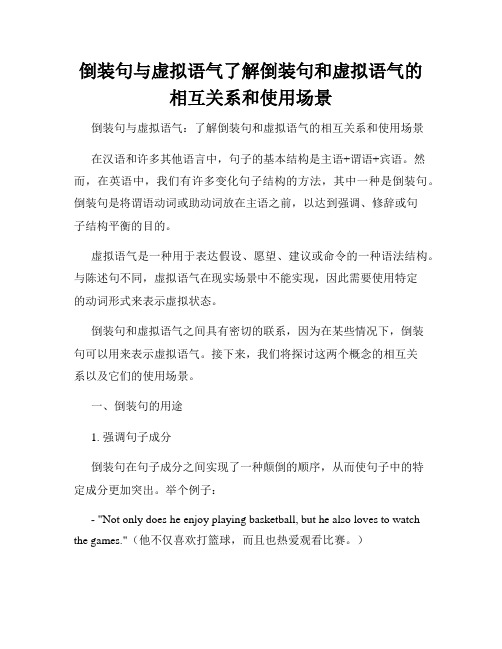
倒装句与虚拟语气了解倒装句和虚拟语气的相互关系和使用场景倒装句与虚拟语气:了解倒装句和虚拟语气的相互关系和使用场景在汉语和许多其他语言中,句子的基本结构是主语+谓语+宾语。
然而,在英语中,我们有许多变化句子结构的方法,其中一种是倒装句。
倒装句是将谓语动词或助动词放在主语之前,以达到强调、修辞或句子结构平衡的目的。
虚拟语气是一种用于表达假设、愿望、建议或命令的一种语法结构。
与陈述句不同,虚拟语气在现实场景中不能实现,因此需要使用特定的动词形式来表示虚拟状态。
倒装句和虚拟语气之间具有密切的联系,因为在某些情况下,倒装句可以用来表示虚拟语气。
接下来,我们将探讨这两个概念的相互关系以及它们的使用场景。
一、倒装句的用途1. 强调句子成分倒装句在句子成分之间实现了一种颠倒的顺序,从而使句子中的特定成分更加突出。
举个例子:- "Not only does he enjoy playing basketball, but he also loves to watch the games."(他不仅喜欢打篮球,而且也热爱观看比赛。
)在这个例子中,倒装句"Not only does he"将主语"he"和谓语"enjoy playing basketball"的顺序颠倒,从而在句子中强调了主语。
2. 条件句中的倒装在条件句(if-clause)中,倒装句可以用来表达可能性、假设或很强的愿望。
例如:- "Had I known about the party, I would have attended."(如果我早知道宴会的事,我就会去参加了。
)这个例子中的倒装句"Had I known"以及后面的虚拟语气结构"would have attended"表达了与现实情况相反的假设。
高中英语高考语法知识整理复习(虚拟语气+倒装句)

高考英语虚拟语气一、虚拟条件句中的虚拟语气1、表示与现在事实相反的情况从句:If+主语+did (be动词用were)主句:主语+ should/would/might/ could + doIf I were you, I would take an umbrella.如果我是你,我会带把伞。
(事实:我不可能是你)If I knew his telephone number, I would tell you.如果我知道他的电话号码,我就会告诉你。
(事实:不知道)If there were no air or water, there would be no living things on the earth.如果没有水和空气,地球上就不会有生物。
(事实:地球上既有空气也有水)2、表示与过去事实相反的情况从句:If+主语+ had + done主句:主语+should/would/might/could+have doneIf I had got there earlier, I should/would have met her.如果我早到那儿,我就会见到她(事实:去晚了)。
If he had taken my advice, he would not have made such a mistake.如果他听我的劝告的话,就不会犯这样的错误了。
(事实:没有听我的话)3、表示与将来事实相反的情况从句:①if+主语+were to do②if+主语+should+do③if+主语+过去式(be动词用were)主句:主语+should/would/might/could+doIf he should come here tomorrow, I would talk to him.如果他明天来这儿的话,我就跟他谈谈。
(事实:不可能来)If there were a heavy snow next Sunday, we would go skating.如果下周日下大雪,我们就去滑冰。
虚拟语气和倒装句

虚拟语气的用法及专项练习题虚拟语气表示一种假设的情况,或一种主观的愿望,即动词所表示的动作或状态并非事实,或不可能实现。
英语虚拟语气的形式有下列几种:一、与现在事实相反Ifhadthetime,JohnwouldmakeatriptoChinatoseetheGreatWall.IfIwereyou,Iwouldgiveupdrinkingimmediately.二.与将来事实相反Ifyoushouldlose,whatwouldyoudo?IfIweretoseehertomorrow,Iwouldtellherthetruth.Ifyouwenttherenexttime,youwouldseewhatImean.三、与过去事实相反IfI’ddnownthatitwasgoingtorain,Iwouldneverhavegoneforawalkinthecountry.四、虚拟语气的几种特殊用法省掉if的条件从句结构:Had you asked me, I would have told you.(=If you had asked me,…)2.有时虚拟条件不用条件从句而用不定式、分词、介词、名词、连接词或定语从句来表示,如:A true friend would not do such a thing.(=If he were a true friend, he...)(=If there were no water,…)(=If you hadn’ t helped me,…)3.有时条件从句中的动作和结果从句中的动作发生的时间不一致,如:If he had followed the doctor’s advice, he would be quite all right now.If I were you ,I would have gone home.五、虚拟语气的其他用法1、Suggest,advise等动词之后宾语从句须用虚拟语气,其句子结构如下:注意:在此结构中that不可省略;should省不省均可。
虚拟语气、倒装
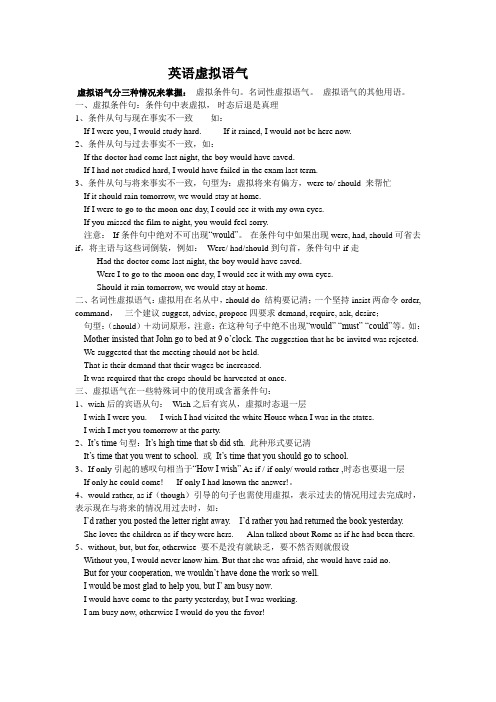
英语虚拟语气虚拟语气分三种情况来掌握:虚拟条件句。
名词性虚拟语气。
虚拟语气的其他用语。
一、虚拟条件句:条件句中表虚拟,时态后退是真理1、条件从句与现在事实不一致如:If I were you, I would study hard. If it rained, I would not be here now.2、条件从句与过去事实不一致,如:If the doctor had come last night, the boy would have saved.If I had not studied hard, I would have failed in the exam last term.3、条件从句与将来事实不一致,句型为:虚拟将来有偏方,were to/ should 来帮忙If it should rain tomorrow, we would stay at home.If I were to go to the moon one day, I could see it with my own eyes.If you missed the film to night, you would feel sorry.注意:If条件句中绝对不可出现“would”。
在条件句中如果出现were, had, should可省去if,将主语与这些词倒装,例如:Were/ had/should到句首,条件句中if走Had the doctor come last night, the boy would have saved.Were I to go to the moon one day, I would see it with my own eyes.Should it rain tomorrow, we would stay at home.二、名词性虚拟语气:虚拟用在名从中,should do 结构要记清;一个坚持insist两命令order, command,三个建议suggest, advise, propose四要求demand, require, ask, desire;句型:(should)+动词原形,注意:在这种句子中绝不出现“would”“must”“could”等。
虚拟语气、倒装句、独立主格

虚拟语气、倒装句、独立主格一.虚拟语气虚拟语气表示说话人的主观愿望、猜疑、建议或与事实不符的假设等,而不表示客观存在的事实。
虚拟语气是由句中的谓语动词的特殊形式表示出来的。
虚拟语气主要分为与现在事实相反,与过去事实相反以及与将来事实相反三个种类。
让我们一一来看下它们的结构和用法吧!1、表示与现在事实相反的情况从句:If+主语+动词一般过去时(Be动词用were)主句:主语+ should/would/might/could+do:If I were you,I would take an umbrella.如果我是你,我会带把伞。
(事实:我不可能是你)If I knew his telephone number,I would tell you.如果我知道他的电话号码,我就会告诉你。
(事实:不知道)If there were no air or water,there would be no living things on the earth.如果没有水和空气,地球上就不会有生物。
(事实:地球上既有空气也有水)If I had any money with me,I could lend you some.如果我带钱了,我就会借给你些。
(事实:没有带钱)If he studied harder,he might pass the exam.如果他再努力些,就能通过考试了。
(事实:没有努力)If I were you,I'd wear a shirt and tie.如果我是你,我就会穿衬衫和领带。
(事实:我并不是你)2、表示与过去事实相反的情况从句:If+主语+had+done主句:主语+should/would/might/could+have doneeg:If I had got there earlier,I should/would have met her.如果我早到那儿,我就会见到她。
- 1、下载文档前请自行甄别文档内容的完整性,平台不提供额外的编辑、内容补充、找答案等附加服务。
- 2、"仅部分预览"的文档,不可在线预览部分如存在完整性等问题,可反馈申请退款(可完整预览的文档不适用该条件!)。
- 3、如文档侵犯您的权益,请联系客服反馈,我们会尽快为您处理(人工客服工作时间:9:00-18:30)。
语法系列复习专题十-----虚拟语气、倒装句型虚拟语气虚拟语气是通过特殊的谓语动词形式来表达的愿望、假设、怀疑、猜测或建议等语气,它不表示客观存在。
一、虚拟语气在单句中的用法常用来表示祝愿、采用固定的倒装句式。
例如:Long live the People s Republic of China!中华人民共和国万岁!be happy! 快乐!have a good time! 玩得愉快!May you 祝你succeed! 成功!make progress! 进步!二、虚拟语气在复合句中的用法:1.在非真实性条件句和主句中的用法条件从句主句一般过去时(be多用于were)would/should/could/might+动词原形如果我是你,我会接受邀请的。
If I had time,I would go there.如果我有空,我就去那儿。
条件从句主句过去完成时would/should/could/might+have done如果你早点来,你就不会错过那辆公共汽车了。
If he had seen you yesterday,he would have returned your book.如果他昨天见到了你,他就会还你的书的。
条件从句主句一般过去时(be多用were)would/should/could/might+动词原形should do,were to doput off.万一明天下雨,运动会就推迟。
(事实上明天下雨的可能性不大。
)If you dropped/should drop/were to drop the glass,it would break.万一杯子掉下来会打碎的。
4)i f的省略如果条件句中有were,had,should 等助动词,可将if省略,而把were,had或should置于句首,来表达以if引导的条件句的相同意思。
例如:Should it rain/were it to rain tomorrow,the sports meet would be put off./Had he seen you yesterday,he would have returned your book.5)条件句或主句的省略当有上下文或上下句中的语言环境暗示的时候,表示虚拟语气的从句或主句往往可以省略,以避免重复。
例如:——Why didn t you attend the party yesterday?——I would/should have,but I was too busy then.I was surprised that you didn t like this job.You could have done it better.(后面省略了if you had liked it.)6)混合时间条件句和主句条件句和主句的动作发生的时间有先后之差,应按各自动作时间搭配好相应的结构形式。
例如:If the teacher hadn t been ill yesterday,who could give us a lecture now?/If you hadreviewed the lesson,you would answer the question now.7)含蓄条件句和主句即用without(=but for),or(else)代替if 从句。
例如:Without/But for his help,we wouldn t have made such great progress.=If his help,we wouldn t have made such great progress. 2.在as if/as though 引导的状语从句中用法:在as if/as though 引导的状语从句中,谓语动词多用倒退一个时间段的方式来表达虚拟语气。
例如:The man speaks as if he were a foreigner./The speaker told us a lot about that country as though he had been there many times./They talked as if they had been good friends for years.注:as if/as though 从句中不一定都要用虚拟语气。
如果情况真实性、可能性很大,就要用正常时态来描绘。
例如:It looks as if it is going to rain.天看起来象要下雨。
(下雨的可能性很大。
)3.在宾语从句、表语从句、主语从句中的用法:1) 在wish 后的宾语从句中的用法:A .和过去事实相反的愿望:宾从谓语为“had done ”形式。
例如:I wish I had passed yesterday s exam.要是我昨天的测试及格了该多好。
B .和现在事实相反的愿望:宾从谓语为“did ”形式。
例如:He wishes he was as clever as you./I wish I had a large room to live in.C .表示将来愿望:宾从谓语用“would/could do ”形式。
例如:How I wish I would go abroad next year!2)在suggest,propose,demand,request,require,order,insist 等动词后的宾语从句中,谓语为“(should) do ”形式。
例如:I suggest/propose/demand/request/require/order/insist that he(should) be sent to the nearest hospital as soon as possible.3)在“It is (about/high) time +that 从句”结构中,that 从句的谓语用一般过去时或“should do ”形式。
例如:It is high time he 他该开始了。
4)在表语从句、同位语从句中的用法:在suggestion,proposal,request,requirement,advice 等名词后的表语从句、同位语从句中,谓语用“(should) do ”形式。
例如:My suggestion is that we (should) send a few comrades to help the other groups./He gave an order that the work be done at once.虚拟语气考点分析1.——Alice,why didn t you come yesterday?——I _____,but I had an unexpected visitor. (NMET)A.hadB.wouldC.was going toD.did析:此题A 、D 明显不合上下文,因为乙方没有去。
B 选项若为would have 则成立,可以理解为I would have come if I hadn t had an unexpected visitor.的简略式。
但此处是would,故应排除。
只有was going to 可得体地表达“我原本打算去的,但是有不速之客造访”这一意思。
2.If there were no subjunctive,English ______ much easier. (NMET)A.will beB.would have beenC.could have beenD.would be析:观察题干,可知全句表达的是和现在事实相反的虚拟语气。
故答案为D 。
3.The guard at the gate insisted that everybody ______ the rules. (NMET)A.obeysB.obeyC.will obeyD.would obey析:根据insist 后的宾语从句谓语要用(should) do 形式规律,可定正确答案是B 。
4.I wish I _____ you yesterday.A.seenB.did seeC.had seenD.were to see析:此题表和过去事实相反的原望,答案应为C 。
5.—— If he _____ ,he _____ that food.—— Luckily he was sent to the hospital immediately. (NMET)A.was warned;would not takeB.had been warned;would not have takenC.wuld be warned;had not takenD.would have been warned;had not takenthere hadn t been we hadn t got started. should start.析:从对话看,是表达和过去事实相反的虚拟语气,故答案为B。
6.Without electricity human life _____ quite different today. (NMET)A.isB.will beC.would have beenD.would be析:without引出一个含蓄条件句,主句表述的是和现在事实相反的虚拟语气,故答案为D。
7.When a pencil is partly in a glass of water,it look as if it _____. (NMET)A.breaksB.has brokenC.were brokenD.had been broken析;放入水中的铅笔看上去是断的,但实际上并非如此,因此是和现在的事实相反,这时as if从句谓语要用一般过去时,故答案为C。
8.You didn t let me drive.If we _____ in turn,you _____ so tired. (NMET)A.drove;didn t getB.drove;wouldn t getC.were driving;wouldn t getD.had driven;wouldn t have got析:观察题干,可知if从句表述和过去事实相反的假设,因此答案只能是D。
9.I didn t see your uncle at the party.If he _____ ,he would have said hello tome.A.would comeB.had comeC.cameD.did come析:观察题目上下文,特别是第二句的主句谓语为 would have said,可知if从句表述的是和过去事实相反的愿望,因此答案为B。
